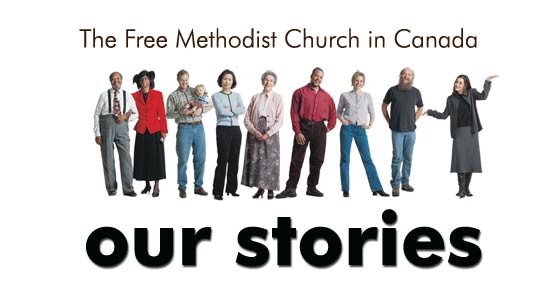Tuesday, August 07, 2007
Common qualities of Wesleyan Cousins at their best!
Have you ever been a visitor to a gathering of somebody else’s extended family – perhaps a wedding or a funeral or maybe you just lucked out and got invited to a family reunion – and stayed with the group long enough to get a sense of what they are like as an extended family? Some families are so laid back that they live on the edge of chaos while other clans can be so uptight that they live on the edge of panic attacks. Most are somewhere else along the spectrum. Of course, you can notice that some family units within an extended family are somewhat different by the choices they make, but even so, there are always common family characteristics.
In this issue, we are talking about the worldview of our extended Wesleyan family, when it is at its best.1 When we speak of the worldview [or ethos] of our movement, in summary, we are talking about what we believe on key doctrinal issues [these are very important] in combination with the behaviour patterns we actually live out as Christ followers as a consequence of what we believe. [James would say that the latter are even more important.]
So if we fellowship in the circles of people who have a healthy Wesleyan worldview, what will we see, hear and sense? Foundationally, we will find orthodox Christians who are uncompromising on the key truths of the Christian faith as enunciated by the historic creeds but catholic in spirit, meaning that they live out their convictions in gracious humility. In fellowship with other Christians, the attitude is: "in essentials we have unity, in nonessentials we have liberty, and in all things we have charity [old English for love].2"
If we press a little further, we will find that Wesleyans treasure the important recoveries of the Protestant reformation - sola fide [that is, we are saved by grace through faith alone] and sola scriptura [i.e. scripture is the primary authority for what we believe and how we live].
If it takes its cues from the foundational truths of the primacy of the scripture and of salvation by grace, it is not surprising that healthy Wesleyans insist on four emphases:
1] All people must be saved. [We are evangelicals.]
2] All people may be saved. [We believe in a universal atonement.]
3] All people may know that they are saved. [We believe in the witness of the Spirit.]
4] All people may be saved fully. [We believe in a deeper work of sanctifying grace in which the Holy Spirit renews us after the likeness of God, changing us through crises and process from one degree of glory to another and conforming us to the image of Christ.]3
In a healthy Wesleyan worldview, the wonderful reality of God’s gracious work is seen through and through. The reality of grace is undivided: it is the outpouring of the love of God in Christ Jesus through the gift of the Holy Spirit that has been given to us. But this same grace can be seen from different angles, depending on the results that it produces in persons at different stages of their response to that grace, and depending on the different situations in which that grace can be experienced. In every part of grace’s effect on us, God provides the gift with which we might cooperate, but against which we might tragically resist. A Wesleyan worldview speaks of the following dimensions of grace:
Prevenient grace – God at work to offer our will the restored capacity to respond to grace;
Convicting grace – God at work, drawing us to himself;
Justifying grace – restoring us in our relationship with God and releasing us from the guilt of sin;
Sanctifying grace – see my comments above in [4];
Glorifying grace – the grace to enter into the presence of God after this life and become fully like him, for we shall see him as he is.
Thomas Oden talks about another dimension of a Wesleyan worldview which I believe we are seeing first signs of recovering in our movement. He talks about "eschatological responsibility" in which we are "called to understand our present ecological accountability within creation as a final accountability to which we will be called on the last day."4
In other words, healthy Wesleyans think about ecology and justice and poverty as concerns that are always important to the Lord of all creation to whom we will ultimately be accountable on judgment day. They welcome the current attention that is being given to these issues and earnestly hope that they will be more than just passing fads.
So these are themes that flow in a healthy Wesleyan worldview. Obviously, they are shared generally with the wider Christian family, but you’ll notice that there are combinations of perspective and emphasis that make the Wesleyan family what it is in its ethos.
So, if this is what healthy Wesleyans fundamentally believe, and if faith and works [or talk and walk, or theology and practice] are always to be integrated into a healthy relationship with each other, what attitudinal and behavioral patterns should one see in the movement? The implications are profound and far reaching. I‘ll mention these and you can read more in the positional papers section of the FMCiC website at: www.fmc-canada.org/who/positional_papers.html [and specifically: www.fmc-canada.org/who/papers/The-Elements-of-a-Methodist-Ethos.pdf ].
• Catholicity of spirit speaks to grace filled relationships within and beyond the movement.
• A respect for the historic faith coupled with an openness to the gracious movement of the Holy
Spirit fosters "both and" approaches in congregational life – particularly in corporate worship.
• If all people need to be saved, godly grace says that all people need to hear the good news.
• If the Holy Scriptures are the primary authority for what Wesleyans believe and how they live, its message calls people to be wholesome and Christlike.
• An understanding of true eschatological responsibility speaks to how we use and share the earth’s resources.
In case you are wondering, I’m an enthusiastic Wesleyan. I am first of all a devoted follower of the Lord Jesus Christ, but I love how Wesleyans view life!
Rev. Keith Elford is Bishop of The Free Methodist Church in Canada
1 Several years ago, the Study Commission on Doctrine developed a document to define the elements of a Methodist ethos. The resulting work is on the FMCIC website [www.fmc-canada.org ] in the "Who We Are" section and I draw heavily from it in several places in this article.
2 A statement first attributed to St. Augustine
3 Taken from the new FM statement on sanctification
4 John Wesley’s Scriptural Christianity by Thomas Oden (Zondervan Publishing House, 1994), p.130


No comments:
Post a Comment